- Home
- Simon Beckett
The Chemistry of Death dh-1 Page 16
The Chemistry of Death dh-1 Read online
Page 16
'Don't you believe in second chances?'
'They're not second chances, just different ones. Your life's never going to be the same as it would if you'd made a different decision first time round.' Her face had clouded. She pulled her hand from the stone, suddenly embarrassed. 'God, listen to me. Sorry,' she laughed.
'No need to be,' I said, but she was already ducking out through the doorway.
I followed her out, giving her time to get over whatever dark thoughts had surfaced. Under the blond cap of her hair, the nape of her neck was tanned and smooth. A whorl of fine white hairs ran down her neck to disappear into her top. I felt an impulse to touch them and looked away with an effort.
When Jenny turned around she was bright again. 'Do you think the wine will be cool enough yet?'
'Only one way to find out.'
We went back to the boat and took the bottle from the lake. 'Are you OK having this?' I asked. 'I bought some water as well.'
'No, wine would be perfect, thanks. I've had my insulin shot this morning. I'll be fine with one glass.' She grinned. 'Besides, I'm with a doctor.'
We drank it on the bank under the willow. We'd hardly spoken since coming back from the ruins, but the silence wasn't uncomfortable.
'Do you ever miss living in a city?' she asked at last.
I thought about my recent trips to the lab. 'Not until recently. Do you?'
'I don't know. I miss some things about it. Not so much stuff like bars and restaurants. More the busyness of it all. But I'm getting used to the country. It's just about changing pace, really.'
'Do you think you'll go back?'
She looked at me, then out at the water. 'I don't know.' She snapped off a grass stem. 'How much did Tina tell you?'
'Not much. Just that you'd had a bad experience, but she didn't say what.'
Jenny smiled, plucking at the grass stem. 'Good old Tina,' she said, dryly but without rancour. I waited, letting her make up her mind whether to say more or not.
'I was attacked,' she said after a while, keeping her eyes on the grass. 'About eighteen months ago. I'd been out with some friends and caught a taxi home. Like you're supposed to. Streets not safe and all that. It had been someone's birthday, and I'd had a bit too much to drink. I fell asleep, and when I woke up the driver had parked and was getting into the back with me. When I put up a struggle he started hitting me. Threatened to kill me, and then…'
Her voice had grown unsteady. She paused for a moment before continuing, in control again.
'He didn't actually get to rape me. I heard some people nearby. He'd parked in an empty car park, and this group were cutting across it. Just fluke, really. So I started yelling and kicking on the window. He panicked, pushed me out of the car and drove off. The police said I'd been lucky. And they were right. I'd come out of it with just a few cuts and bruises, it could have been a lot worse. But I didn't feel lucky. I just felt scared.'
'Did they catch him?'
She shook her head. 'I couldn't give them much of a description, and he drove off before anyone could get his number. I didn't even know the name of the taxi company, because I'd flagged him down in the street. So he's still out there somewhere.'
She flicked the grass into the water. It floated on the surface, barely making an impression.
'It got so I was afraid to go out. I wasn't frightened of seeing him again, it was just… everything. It was like, if something like that had happened for no reason once, it might again. Any time. And so I decided to get out of the city. Go and live somewhere nice and safe. Saw this job advertised and ended up here.' She gave a crooked smile. 'Good move, hey?'
'I'm glad you did.'
The words were out before I knew it. I quickly looked out across the lake, anywhere but at her. Idiot! I fumed. Why the hell did you say that?
Neither of us spoke. I turned to find her watching me. She gave me a hesitant smile.
'Want a crisp?' she asked.
The awkwardness passed. Relieved, I reached for the wine.
In the coming days I would look back on this afternoon as one last glimmer of blue sky before the storm.
16
The next week passed in a state of limbo. A subdued tension filled the air like ozone, a dull anticipation as everyone waited for something to happen.
Nothing did.
The general mood matched the landscape, flat and becalmed. The weather continued as hot and unblemished as ever, without any hint of gathering clouds. The police investigation ground on, producing no sign of either suspect or victim, and the streets became noisy as every child of school age celebrated the start of their long summer break. I returned to my normal hours at the surgery, and if there were more patients now asking to see Henry, or an element of reserve in many of those I did see, I chose not to notice it. This was my life now, and Manham, for better or worse, my home. Sooner or later even this would pass, and then some sort of normalcy would return.
That was what I told myself, anyway.
I saw Jenny regularly over the following days. One evening we drove out for dinner to a restaurant in Horning, where the tables had linen cloths and candles, and the wine list was more than a choice between red or white. It already seemed as if we'd known one another for years instead of having just met. Perhaps that was partly because of what we'd each been through. We'd both experienced a side of life that was a foreign country to most people, discovered how tenuous was the line separating the everyday from tragedy. The knowledge bonded us like a private language, unspoken most of the time, but there nevertheless. It had seemed natural to tell her about my history, about Kara and Alice, and about the forensic work I'd been carrying out for Mackenzie. She'd listened without comment, only briefly touching my hand when I'd finished.
'I think you're doing the right thing,' she said, allowing the contact to linger a moment before quickly moving her hand away. And then, without awkwardness or embarrassment, we'd started talking about something else.
Only on the way back was there any tension. Jenny withdrew further into herself the closer we drew to Manham. The conversation that had been effortless first became stilted, then dried up altogether.
'Is everything OK?' I asked as I pulled up outside her house.
She nodded, but too quickly. 'Well, good night,' she said in a rush, opening the car door. But she hesitated before she climbed out.
'Look, I'm sorry, I just… I don't want to hurry into anything.'
I nodded, numbly.
'No, I don't mean… It's not that I don't want…' She drew a deep breath. 'Just not yet, all right?' She gave me an uncertain smile. 'Not yet.'
Before I could answer she'd leaned into the car and given me a kiss, a fleeting brush of her lips, before hurrying into the house. I felt breathless, buoyed and guilty at the same time.
But her words stayed with me for another reason. Not yet. That had been the answer Linda Yates had given me when I'd asked if she'd dreamed about Lyn. I saw her again one afternoon, during the lull when the entire village was waiting for something to happen. She was hurrying along the main street, a look of preoccupation on her face, and didn't notice me until she was a few feet away. When she did she pulled up short.
'Hi, Linda. How are the boys?'
'Fine.' I was about to go on, but she called me back. 'Dr Hunter
I waited. She darted a quick look around, making sure no-one was in earshot. 'The police… are you still helping them? Like you said?'
'Sometimes.'
'Have they found anything?' she blurted.
'Come on, Linda, you know I can't tell you that.'
'But they've not found her yet? You know. Lyn?'
Whatever her reason for asking, it wasn't idle curiosity. Her anxiety was unmistakable. 'Not as far as I know.'
She nodded, but didn't seem reassured.
'Why?' I asked, although I was already starting to suspect.
'Nothing. I just wondered,' she mumbled, already scurrying off.
I watched her g
o, disturbed by the encounter. I had the uneasy impression that she hadn't been looking for news so much as confirmation. And I didn't need to be told why. Like Sally Palmer, Lyn Metcalf had finally made an appearance in her dreams.
But I quickly dismissed the notion. I'd been living in Manham too long if I was starting to believe in premonitions, or attach importance to dreams. Hers or mine. It was easy to be complacent. My own sleep had been undisturbed recently, my waking thoughts ones of Jenny and the future. It was as though I was surfacing into the air again after a long time underground. Selfishly, in spite of everything, it was hard not to feel optimistic.
Then, midway through the next week, the inertia broke. The body of the young man was identified when his dental records provided a match with those of a 22-year-old man. Alan Radcliff had been a postgraduate ecology student from Kent who had disappeared five years earlier. He'd been in the area, studying the countryside around Manham. At some point, he'd become a part of it. When his photograph was released a few people in the village could even remember him: a good-looking young man with an engaging smile. For a few weeks while he camped out on the marshes he'd become a familiar face in the village, brightening the days of the village girls before he moved on.
Except he hadn't gone anywhere.
Manham reacted to this new development almost without comment. With the victim's identity and connection to the area now known, no-one needed to state the obvious: the body's location couldn't be dismissed as a coincidence. The village could no longer distance itself from this very literal skeleton from its past.
Coming on top of everything else, it was another, unlooked-for blow. And then, while this was still being absorbed, came a far worse one.
I was just about to start afternoon surgery when the call came. I'd spoken to Mackenzie only the day before, when the student's body had been identified, and it was a mark of how far I'd let my defences slip that I assumed this would be something relating to that. Even when he said he needed to see me straight away I didn't make the connection.
'Surgery's about to start,' I said, phone tucked under my ear as I signed a prescription form. 'Can it wait until later?'
'No,' he said, and hearing his bluntness I stopped writing. 'I need you out here now, Dr Hunter. As soon as possible,' he added, as a sop to courtesy. But it was clear that politeness wasn't a priority for him right now.
'What's happened?'
There was a pause. I guessed he was weighing up how much he could tell me over a public phone line.
'We've found her,' he said.
There are around a hundred thousand different species of flies. Different shapes, different sizes, different life-cycles. Blowflies, or blue- and green-bottles as the most familiar types are more commonly known, are part of the Calliphoridae family. They breed on decaying organic matter. Rotting food, faeces, carrion. Almost anything. Most people can't see the point of them. They're disease-carrying irritants, as ready to feed on fresh dung as fine cuisine, which they do in both cases by regurgitating onto it.
But, as with everything else in nature, they play their role. As repulsive as it may seem, flies play an essential part in the breakdown of organic matter, helping to speed the process of dissolution, returning the dead to the raw materials of which they're composed. They're nature's own recycling mechanism. And, as such, there's a certain elegance to their single-minded devotion to their task. Far from being pointless, in the greater scheme of things, they're more important than the hummingbird or deer on which they'll one day feed. And from a forensic perspective, flies are not just an unavoidable evil, they're invaluable.
I hate them.
Not because I find them irritating or disgusting, although I'm no more immune to those aspects than anyone else. Or even because they're a reminder of our ultimate physical fate. I hate them because of the noise.
The flies' music was audible as I made my way across the marsh. At first it was almost felt rather than heard, a low thrumming that seemed part of the heat itself. It grew steadily more pervasive as I approached the centre of activity, a senseless, idiot drone which seemed to constantly waver in pitch without actually changing. The air became busy with darting insects. I waved away those that were drawn by the sweat on my face, but by now they were accompanied by something else.
The smell was at once both familiar and repellent. I'd smeared my top lip with menthol, but it cut right through. I'd once heard it likened to an over-ripe cheese left to sweat in the sun. It wasn't – not really. But that was as close as anything came to describing it.
Mackenzie acknowledged me with a nod. The crime scene team went about their tasks in grim-faced silence, faces flushed and damp in the hot coveralls. I looked down at the object that was the reason for all this activity, from the perspiring police officers to the frenzied swarm of flies.
'We haven't moved it yet,' Mackenzie said. 'I wanted to wait until you got here.'
'How about the pathologist?'
'He's been and gone. Said it was too decomposed for him to tell us anything for the moment, except that it was dead.'
It was that all right. It had been a long time since I'd been to a crime scene and looked on what had until recently been a living, breathing person. Sally Palmer's body had already been taken away by the time I'd arrived, and examining it later, in the sterile environment of a lab, was a far more clinical business. Even the remains of Alan Radcliff had been buried for so long they'd become a mere structural relic, with precious little evidence of humanity left about them. This, though, this was different. This was death in its busiest, awful glory.
'How did you find it?' I asked, pulling on a latex glove. I'd already suited up at the nearby trailer. We were several miles from the village, in a bleak region of drained marsh almost diametrically opposed to where the first body had been found. The lake glinted indifferently a few hundred yards away. This time I'd come prepared, and underneath the coveralls I was wearing only shorts. Even so, I was already slick with sweat, just from walking the short distance.
'The chopper spotted it. Fluke, really. They had some sort of systems glitch, so they were on their way back. They wouldn't have flown over here if not. This area's already been searched.'
'When was the last time?'
'Eight days ago.'
That gave us an upper limit of how long the body had been here. Perhaps also how long it had been dead, although that was less certain. People have been known to move bodies, sometimes more than once.
I snapped my other glove into place. I was ready, but felt no enthusiasm for what I was about to do. 'You think it's her?' I asked Mackenzie.
'Officially, we'll have to wait until a formal identification. But I don't think there's much doubt.'
Neither did I. There had already been one reprieve when the grave had yielded the long-dead student. Somehow I didn't think there would be another.
Lyn Metcalf was unrecognizable. Her body lay face down, half-hidden by hummocks of marsh grass. She was naked, but on one foot was a single running shoe, incongruous and somehow pitiful. She'd been dead for several days, that much was obvious. Death had wrought its usual grim changes, a reverse alchemy transforming the gold of life into a base and stinking matter. But at least this time her killer hadn't added his own obscene modifications.
There were no swan wings.
I shut down the part of me that kept trying to superimpose a memory of the smiling young woman I'd bumped into only the week before and went to examine the body. There were what looked like several slashes in the darkened skin. But the most obvious wound was to the throat. Although the body lay face down, the extent of it was still all too apparent.
'Can you say how long she's been dead?' Mackenzie asked. 'Just roughly,' he added, before I could say anything.
'There's still soft tissue left, and skin slippage is only just starting.' I gestured at the wounds, now boiling colonies of maggots. 'And with this amount of larval activity, we're probably looking at between six and eight days.'
'Can't you narrow it down?'
I was about to point out that he'd asked for a rough estimate only a second before, but stopped myself. This wasn't pleasant for any of us. 'The weather's been constant, so assuming the body hasn't been moved, to get to this stage I'd say six or seven days in this heat.'
'Anything else?'
'Same sort of wounds as we saw on Sally Palmer, though not quite so many. Severed throat, and the body's pretty desiccated again. Not as much, obviously, because it's not been dead as long. But I'd take a preliminary guess that it bled out.' I examined the blackened vegetation around it, seared by the alkali-rich chemicals released by the body. 'We'll need to test iron content to be sure, but I'd guess she was killed somewhere else and dumped here, like last time.'
'Same person did it, would you say?'
'Come on, I can't tell you that,' I said.
Mackenzie grunted. I could understand his unease. In some respects this was similar to Sally Palmer's murder, but there were enough departures from it to raise doubts that the same man was responsible. From what we could see so far there were no facial injuries. More significantly, the bird or animal fetish that had been evident before was conspicuously absent. From a detection point of view, that presented worrying problems. Either something had happened to force the killer to change his methods, or he was so erratic that there was no pattern to his actions. The third possibility was that the murders were the work of two different people.
None of the options offered much cause for optimism.
The monotone hubbub of the flies provided a backdrop as I took my samples. By the time I straightened, my joints and muscles were stiff from crouching.
'Finished?' asked Mackenzie.
'Pretty much.'
I moved back. The next step was never a pleasant one. Everything that could be managed without moving the body had been done; photographs taken and measurements made. Now came the moment when we would see what lay underneath. The crime scene officers carefully began to turn the body over. Disturbed, the whine of the flies became more agitated.

 Where There's Smoke
Where There's Smoke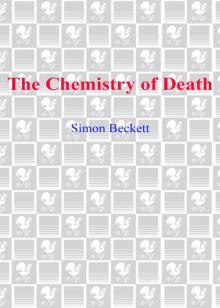 The Chemistry of Death
The Chemistry of Death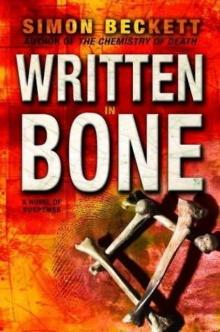 Written in Bone
Written in Bone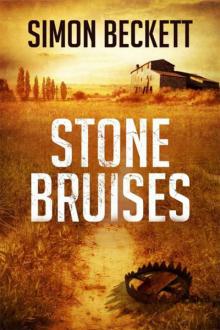 Stone Bruises
Stone Bruises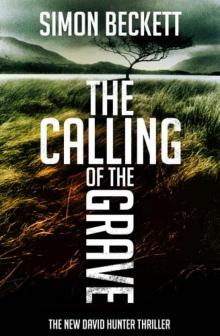 The Calling of the Grave
The Calling of the Grave Whispers of the Dead
Whispers of the Dead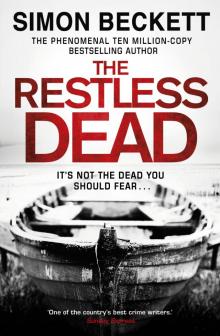 The Restless Dead
The Restless Dead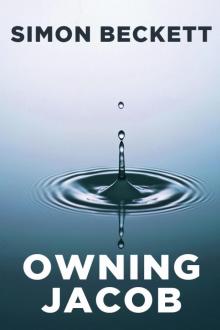 Owning Jacob
Owning Jacob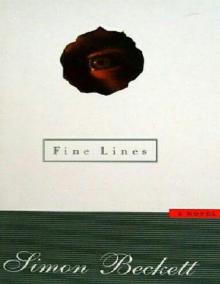 Fine Lines
Fine Lines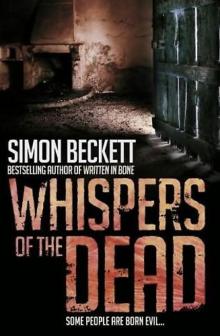 Whispers of the Dead dh-3
Whispers of the Dead dh-3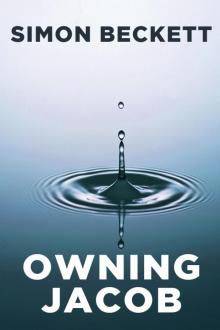 Owning Jacob (1998)
Owning Jacob (1998)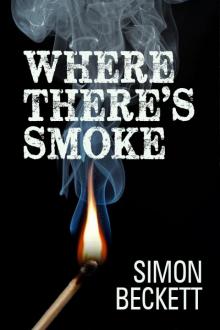 Where There's Smoke (1997)
Where There's Smoke (1997)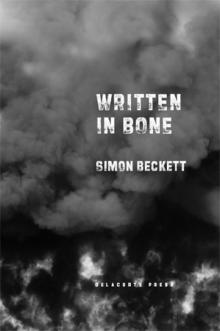 Written in Bone dh-2
Written in Bone dh-2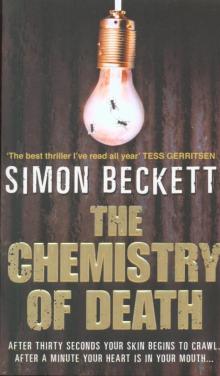 The Chemistry of Death dh-1
The Chemistry of Death dh-1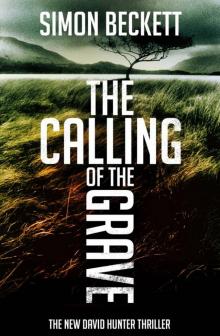 The Calling Of The Grave dh-4
The Calling Of The Grave dh-4